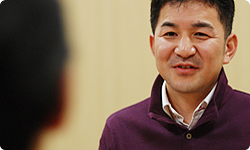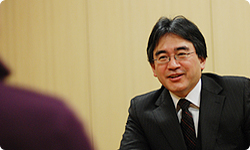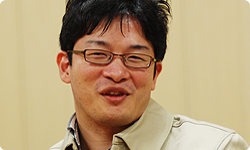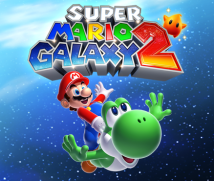2. Field Trip to the Recording Session
(After watching the orchestra video) I bet the people who were there at the time had a blast with this, too.
You're right. Lots of the staff said "I want to watch the recording!" this time, and I wanted to as well, so the entire development staff went...
All of them? You took, not just part of the staff, but every single person involved in development?
Yes. I had them all come on a field trip.
A team field trip... Yokota-san, that was pretty extravagant of you (laughs).
Oh, yes (laughs). Of course it would have been impossible if the “higher-ups” hadn't given us the OK. There wasn't enough room in the hall for all of us to go in at once, so we watched in shifts...
And what did Miyamoto-san have to say?
He was pretty okay with it. He said, "Well, it's close, so sure, why not?", something like that.
I see.
I really wanted everyone to see what it was like, all those people with different instruments creating one piece of music.
You wanted to show them what the performance looked like.
Yes, that's it.
You know, just watching this video makes you listen to the orchestra music a bit differently in places, doesn't it? You can't tell what sort of expressions people are making as they play, or what sort of people they are, just by listening to the CD. Since that's so, I think I understand what you were after when you thought "I want everyone to see this" and took them all along.
Thank you very much. That's a relief (laughs).
I think this probably produced ripple effects among the staff, too. It may have changed their sense of the music, and the way they think about teamwork.
It did. One of the designers said, "We'll have to raise the bar for our picture quality much, much higher, so we don't lose out to this music!", and some members who'd never say they were moved about anything said, "Well, I was really moved". And what moved them, exactly? Even though it's an orchestral recording, the orchestra isn't able to play the music smoothly at first. At the beginning, they were awkward. Awkward enough that it made you wonder if they'd really be all right.
But they rehearse a few times, and you can see them getting better, right before your eyes.
That's it. You can see professionals' power of concentration and heightened consciousness, all bent on perfecting this one thing. That aspect of it communicated itself even to people who weren't involved in music at all; I heard lots of people say, "It's like making a game, isn't it?"

With game creation, you start by groping blindly, then move closer and closer to perfection. That really does seem like an orchestral performance.
Yes. Unless the people from all different sections exercise their strengths to the maximum, the music won't be complete. To me, that really felt like game creation.
The musicians were extremely professional; they'd raise their hand and say, "Let me do this part one more time", even if no one around them had noticed anything wrong.
Miyamoto-san was telling me about that, too. The musicians' proactive attitude really left an impression on him. He said it was interesting to watch the musicians say "Excuse me, let me do that part once more", even though nobody else had noticed a mistake, and see them perform the part again, repeating the process over and over, until gradually the whole thing came together.
I was truly amazed by their attitude. They'd finish a performance, and we'd think they'd gotten a good recording, and just when we were saying, "Okay, great, let's move onto the next song", they'd say "No, wait!"
Not only that, but the other musicians didn't grumble about it. They all cooperated with each other, and the atmosphere just seemed to be very open with regard to corrections.
That's right. One person would correct something, then more would follow, one after another, raising their hands and saying "Me too". Honestly, I couldn't even tell where they'd messed up, but I could tell quite clearly that it got better and better.
Nagamatsu-san, what did you think?
When I was a student, I was involved with an orchestra and a brass band...
Playing an instrument, you mean?
I played, yes, and I also provided songs for the brass band.
So you were already familiar with that world. What were your impressions when you watched this recording?
I was very moved. I mean, the calibre was completely different. The people gathered for this recording were the very best musicians, professionals among professionals.
About how many people were there?
Sixty in the orchestra alone. There were about fifty last time, so in that sense, too, the scale felt larger. Then, if the musicians were professionals among professionals, the conductor was as well. A man by the name of Taizou Takemoto4... 4 Taizou Takemoto: A conductor active across a wide range of genres, in movie music and game music, with a primary focus on classical music.
That would be the Takemoto-san from the Smash Bros. concert5, wouldn't it? I've had the privilege of meeting him and talking with him directly, too. 5 Smash Bros. concert: The "Super Smash Bros. Melee Orchestral Concert" held in Tokyo in August of 2002. Hosted by Nintendo and HAL Laboratory, Inc.
Oh, yes, that's right. This time, before Takemoto-san conducted the session, we had him stop by Nintendo and gave him the opportunity to listen to the demo music. When we asked him, "Would you like to listen to the music by itself first?", he said, "The people playing the game won't listen to the music by itself, and they'll probably play the game with the sound effects on as well, so please let me listen to the sound effects too".
You mean Takemoto-san said he wanted to wave his baton after he understood the role the background music as a whole played in the game?

Yes, that's right.
It's the same as what we saw before, with the musicians. They knew what sort of role they had to fulfill and kept trying for a perfect performance, even after they were given an OK.
That's exactly it.
Truly a professional among professionals.
Besides that, Takemoto-san really liked games to begin with. Even during our meeting, he'd casually use game terminology. For example, we'd say, "This is the final boss fight, so we'd like some serious, weighty conducting", and he'd say, "In the fight with the 'last boss', yes, I see" (laughs).
Then, when he was actually conducting, the way he explained it to the musicians was impressive, too. He'd say things like, "The piece we're going to play next comes during the dramatic clash with the last boss!"

(laughs)
Or, "This is the scene where they rescue the princess, so everyone play like a hero!"
He said things like that while he was conducting? That must have been pretty electrifying.
Not only that, but Takemoto-san’s conducting is a joy just to watch. The way he moved his hands looked almost like ballet, and on the desert scene music, he conducted as if he were dancing.
As he conducted, he wriggled his body the way they do in Arabian dances.
Wow...
I thought it was pretty amazing, the way he communicated the atmosphere with his body while conducting, not just with words.
In the video you just saw, there was a scene where Takemoto-san seemed to be having a lot of fun conducting. When the conductor performs that way, the musicians feel as though they need to play music that feels that enjoyable, and they work very hard. For that reason, even compared to the last game, I think the music as a whole is emotionally richer.
